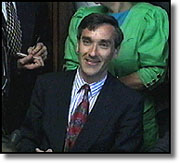
|
Leadership contenders in row over MajorJune 10 has been set as the date for the first round of voting for the new Conservative leader. Meanwhile a fierce debate rages on the quality of John Major's premiership among those seeking to replace him as leader of the Conservative party.John Redwood, who unsuccessfully challenged Mr Major in 1995, has declared that Mr Major stretched the loyalty of party members to "breaking point". Speaking at a press conference promoting his leadership bid, Mr Redwood said: "Towards the end of the last government, many party activists left the theatre. By the time the curtain came down, we were playing to an empty house." Similar criticism of Mr Major was voiced on Wednesday by the bookmaker's favourite for the leadership, William Hague. Mr Hague slammed what he described as the "constantly shifting fudge" of the recent past. Meanwhile Willaim Waldegrave the former Chief Secretary to the Treasury who lost his seat at the general election as given his backing to Mr Hague. "I believe that William Hague has the qualities of determination, common sense, and moderation which are needed", he said. "In my view he can embody the new start we need without putting at risk the achievements of Conservative governments since 1979 which have transformed this country for the better." In a bid to restore public confidence in the Tories, Mr Redwood set out five key principles "that matter":
Stephen Dorrell, the Shadow Health Secretary and another leadership candidate, launched a robust defence of the former Prime Minister. In a statement, he said: "History will be very kind to John Major. Conservatives should be very proud of our record between 1979 and 1997...I am proud to have been a member of the government during that time."
Meanwhile, the former Social Security Secretary, Peter Lilley, presented himself as "the unity candidate" for the leadership. Mr Lilley emphasised that the Tories should not "allow our party organisation to become a factional battlefield."
|
Diana, Princess of Wales, 1961-1997
Conference 97
Devolution
The Archive
News |
Issues |
Background |
Parties |
Analysis |
TV/Radio/Web
Interactive |
Forum |
Live |
About This Site
News |
Issues |
Background |
Parties |
Analysis |
TV/Radio/Web
Interactive |
Forum |
Live |
About This Site
© BBC 1997 |
politics97@bbc.co.uk |
